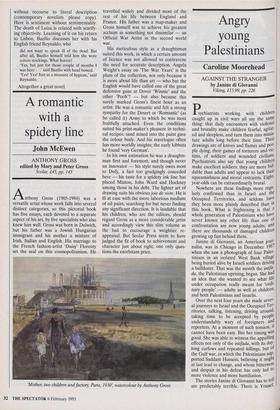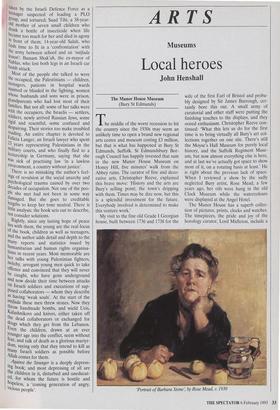Angry young Palestinians
Caroline Moorehead
AGAINST THE STRANGER by Janine di Giovanni Viking, f15.99, pp. 226 Psychiatrists working with children caught up in civil wars all say the same thing: that daily encounters with violence and brutality make children fearful, agitat- ed and sleepless, and turn them into minia- ture adults long before their time. Their drawings are of knives and flames and peo- ple dying; their games of torturers and vic- tims, of soldiers and wounded civilians Psychiatrists also say that young children make excellent soldiers: they are more bid- dable than adults and appear to lack their squeamishness and moral restraints. Eight- year-olds can be extraordinarily brutal.
Nowhere are these findings more regu- larly confirmed than in Israel and the Occupied Territories, and seldom have they been more plainly described than ►n this book. What is frightening is that a whole generation of Palestinians who have never known any other life than one of confrontation are now young adults; and there are thousands of damaged children growing up fast behind them.
Janine di Giovanni, an American jour- nalist, was in Chicago in December 1987 when she saw a photograph of four Pales- tinians in an isolated West Bank village being buried alive by Israeli soldiers driving a bulldozer. That was the month the intila- da, the Palestinian uprising, began. She had an idea that she wanted to see what life under occupation really meant for 'ordi- nary people' — adults as well as children, and both Palestinians and Israelis.
Over the next four years she made sever- al journeys to Israel and the Occupied Ter- ritories, talking, listening, driving around, taking time to be accepted by people understandably wary of foreigners and reporters. At a moment of such tension, it cannot have been easy. But her timing was good. She was able to witness the appalling effects not only of the intijada, with its day- long curfews and repeated killings, but of the Gulf war, in which the Palestinians sup- ported Saddam Hussein, believing it might at last lead to change, and whose bitterness and despair in his defeat has only led to more violence and more humiliation. The stories Janine di Giovanni has to tell are predictably terrible. There is YouseC taken by the Israeli Defence Force as a teenager suspected of leading a PLO group, and tortured; Saud Tibi, a 38-year- old mother of seven small children who drank a bottle of insecticide when life became too much for her and died in agony in front of them; 14-year-old Salah, who finds time to fit in a 'confrontation' with the army between school and an `intifada lesson'; ; Bassam Shak'ah, the ex-mayor of Nablus, who lost both legs in an Israeli car bomb attack.
Most of the people she talked to were the occupied, the Palestinians — children, teenagers, patients in hospital wards maimed or blinded in the fighting, women Whose husbands and sons were in prison, grandparents who had lost most of their families. But not all: some of her talks were With the occupiers, the Israelis — settlers, soldiers, newly arrived Russian Jews, some rigid and resentful, some confused and despairing. Their stories too make troubled leading. An entire chapter is devoted to Felicia Langer, an Israeli lawyer who spent 23 years representing Palestinians in the military courts, and who finally fled to a lectureship in Germany, saying that she was sick of practising law 'in a lawless environment, a country without justice'. There is no mistaking the author's feel- ings of revulsion at the social anarchy and Psychological trauma caused by over two decades of occupation. Not one of the peo- Ple she met had not been in some way damaged. But she goes to creditable lengths to keep her tone neutral. There is little analysis: the book sets out to describe, not consider solutions.
„he Rightly, since any lasting hope of peace
s with them, the young are the real focus of the book, children as well as teenagers, and the author adds detail and depth to the many reports and statistics issued by humanitarian and human rights organisa- tions in recent years. Most memorable are her talks with young Palestinian fighters, twitchy, arrogant young men quick to take °ffence and convinced that they will never be caught, who have gone underground and now divide their time between attacks on Israeli soldiers and executions of sup- Posed collaborators — whom they describe as having 'weak souls'. At the start of the intifada these men threw stones. Now they throw handmade bombs, and wield Uzis, Kalashnikovs and knives, either taken off the dead collaborators or exchanged for drugs which they get from the Lebanon. .ven the children, drawn at an ever Younger age into the conflict, seem without fear, and talk of death as a glorious martyr- dom, saying only that they intend to kill as many Israeli soldiers as possible before Allah comes for them.
Against the Stranger is a deeply depress- ing book; and most depressing of all are the children in it, disturbed and uneducat- ed, for whom the future is hostile and hopeless, a 'coming generation of angry, vicious people'.























































 Previous page
Previous page